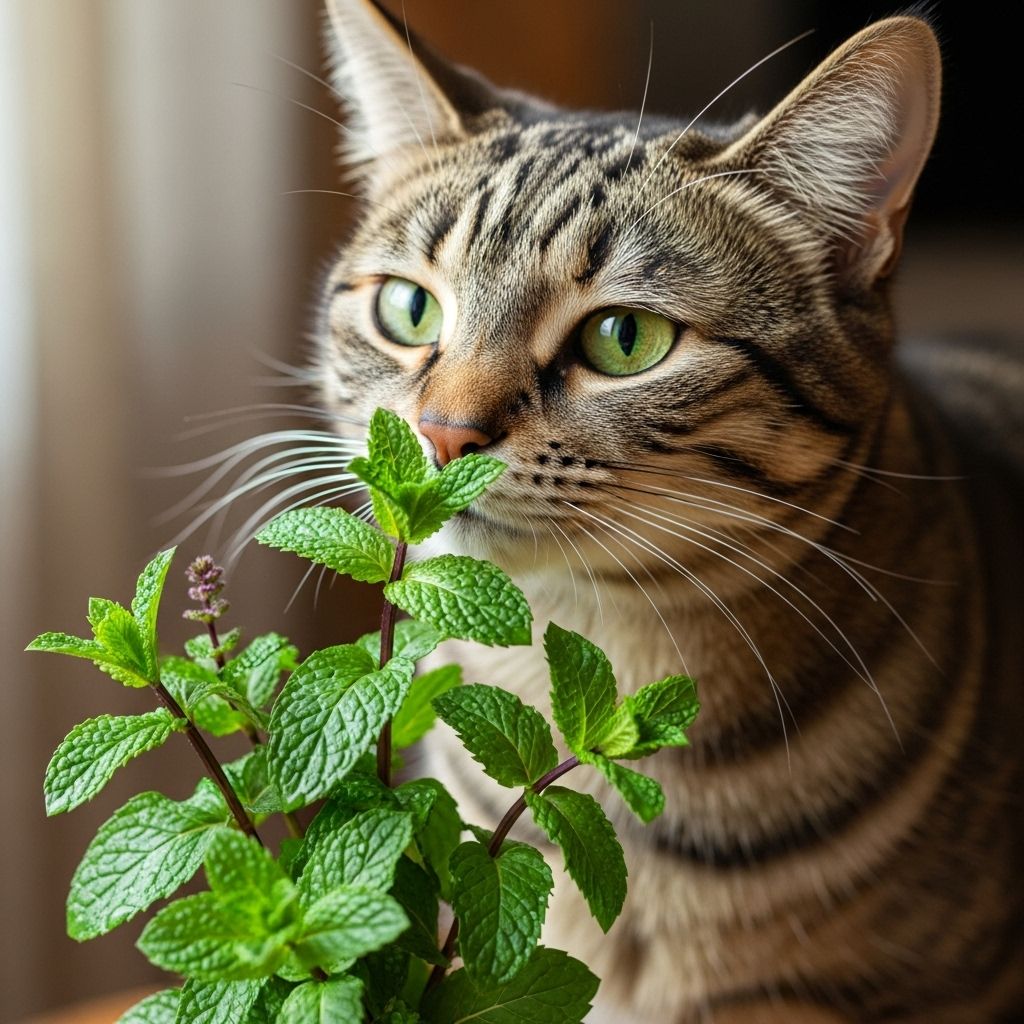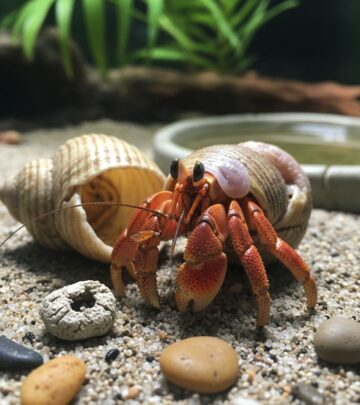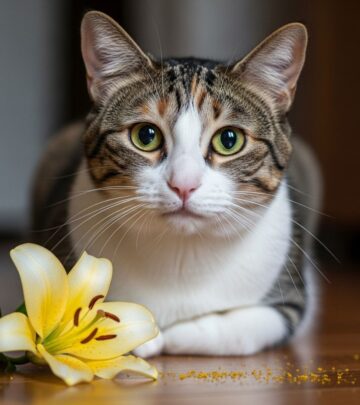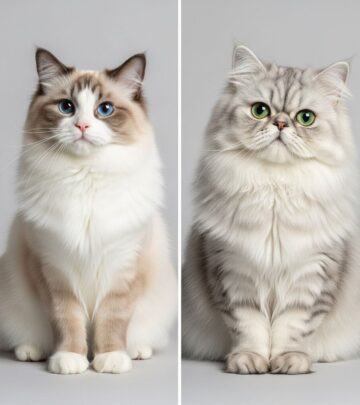Can Cats Eat Peppermint? Vet-Reviewed Facts & Precautions
Understanding the risks and safety of peppermint for cats, with expert insights on toxicity, symptoms, and prevention.

Can Cats Eat Peppermint?
Peppermint is a common ingredient in many foods, household products, and even personal care items, so it’s not unusual for cats to encounter it. But is it safe for cats? The short answer is no—peppermint is not recommended for cats, and most types of mint (except for catnip, a distant cousin) are best kept away from feline companions.
Why Peppermint Is Unsafe for Cats
Peppermint contains several compounds that are harmful to cats, including menthone and methyl salicylate (a type of salicylate). While a small nibble may only cause mild digestive upset, larger quantities—or regular exposure—can lead to more serious health issues, including liver and kidney problems. Cats lack the liver enzymes needed to process these compounds efficiently, making them especially vulnerable to peppermint toxicity.
Peppermint oil and extracts are especially dangerous. These concentrated forms can cause severe illness or even death in cats if ingested, inhaled, or applied to their skin. Peppermint oil contains phenols, which cats cannot metabolize, leading to risks such as liver damage, breathing difficulties, and seizures.
Signs of Peppermint Toxicity in Cats
If your cat is exposed to peppermint, watch for these symptoms:
- Drooling and vomiting
- Diarrhea and stomach upset
- Lethargy or weakness
- Difficulty breathing
- Tremors, seizures, or wobbliness
- Liver and kidney problems (in severe cases)
Skin irritation is also possible from contact with peppermint leaves or products. If you notice any of these signs, contact your veterinarian immediately.
Peppermint Exposure: Common Sources and Prevention
Household Sources
Cats may encounter peppermint in a variety of household items, including:
- Foods: Peppermint candies, cookies, gum, or other snacks. Note that peppermint gum often contains xylitol, which is highly toxic to dogs—its safety in cats is unclear, so it should be considered dangerous. Additionally, many peppermint foods may be paired with chocolate, which is toxic to cats.
- Personal care products: Lotions, shampoos, soaps, and toothpaste containing peppermint.
- Cleaning products and air fresheners: Candles, diffusers, sprays, and cleaning agents with peppermint scent or extract.
- Garden plants: Peppermint, spearmint, and other potted mints or herb gardens.
How to Keep Your Cat Safe
To minimize the risk of peppermint exposure:
- Avoid using peppermint essential oils, extracts, or diffusers in homes with cats.
- Keep peppermint plants and herb gardens out of reach.
- Check ingredient labels on foods, personal care products, and cleaning supplies.
- Store mint-containing items securely.
- Choose cat-safe alternatives for aromatherapy and scenting your home.
Peppermint Oil: A Special Danger
Peppermint oil is highly toxic to cats, even in small amounts. Unlike humans, cats cannot metabolize the phenols in peppermint oil, which can cause:
- Liver damage
- Breathing difficulties
- Seizures
- Digestive issues
Even diffusing peppermint oil in your home can be dangerous, as cats can inhale the oil or get it on their fur and then ingest it while grooming. If you use essential oils, keep cats out of the room and ensure proper ventilation.
Why Are Cats Attracted to Mint Scents?
Cats have a complex relationship with mint-family plants. Some cats may be drawn to peppermint because it contains trace amounts of nepetalactone, the compound that makes catnip so attractive. However, peppermint also contains other compounds (like menthone and salicylates) that are toxic to cats, making it unsafe despite any mild attraction.
Interestingly, while some cats may show curiosity toward peppermint, others may be repelled by its strong scent. This can vary from cat to cat.
Catnip vs. Peppermint
| Feature | Catnip | Peppermint |
|---|---|---|
| Scientific Name | Nepeta cataria | Mentha piperita |
| Active Compound | Nepetalactone | Menthone, Methyl Salicylate |
| Effects on Cats | Euphoric, safe reaction | Potentially toxic, gastrointestinal upset |
| Safety | Generally safe for cats | Not recommended for cats, especially in concentrated forms |
While both are in the mint family, catnip is safe for cats and often enjoyed for its euphoric effect, while peppermint is not. Catnip contains nepetalactone, which does not harm cats, but peppermint contains additional compounds that are toxic to felines.
What to Do If Your Cat Is Exposed to Peppermint
- Identify the exposure: Determine what your cat ate or came into contact with, and in what quantity.
- Monitor symptoms: Watch for mild digestive upset, skin irritation, or more severe signs like lethargy, tremors, or difficulty breathing.
- Contact a veterinarian: If you notice any concerning symptoms, or if your cat ate something with potentially toxic ingredients (like xylitol or chocolate), call your vet or a pet poison helpline immediately.
- Provide information: Have a list of ingredients ready if your cat consumed a non-food product containing peppermint.
Online Vet Services: When You Can’t Get to the Clinic
If you’re unable to reach a veterinarian in person, consider using an online vet service like PangoVet, where you can consult with a professional remotely. This can be especially helpful for mild cases or when seeking quick advice.
Frequently Asked Questions (FAQ)
Q: Can cats eat peppermint leaves?
A: Peppermint leaves are not recommended for cats. While a small nibble may not cause serious harm, regular or significant consumption can lead to toxicity and health problems.
Q: Is peppermint oil safe for cats to sniff or use in diffusers?
A: No, peppermint oil is highly toxic to cats and should never be used in diffusers, applied topically, or allowed anywhere your cat can inhale or ingest it.
Q: My cat ate a peppermint candy—what should I do?
A: Check the ingredients. If it contains xylitol or chocolate, contact your vet immediately. Even if not, monitor your cat for any signs of illness and consult your vet if symptoms appear.
Q: Are there any mint plants that are safe for cats?
A: Catnip (Nepeta cataria) is safe and enjoyable for most cats. Other mints—peppermint, spearmint, regular mint—are not recommended.
Q: Why do some cats seem interested in peppermint?
A: Peppermint is a relative of catnip and contains trace amounts of nepetalactone, which can attract some cats. However, peppermint also contains toxic compounds, so it is not safe for feline consumption.
Q: Can peppermint kill cats?
A: While it’s rare for a small exposure to be fatal, concentrated forms like peppermint oil can be deadly if ingested in sufficient quantity.
Conclusion
Peppermint is not safe for cats. While the occasional small exposure may cause only mild reactions, regular ingestion—especially of essential oils or extracts—can have serious health consequences. Cat owners should keep peppermint and related products away from their pets, and opt for safe alternatives like catnip for feline enrichment. Always consult your veterinarian if you suspect your cat has been exposed to peppermint or any potentially toxic substance.
Read full bio of Sneha Tete












